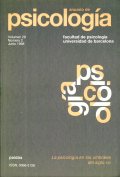Psychologie et problématiques éducatives
Keywords:
Psychology and Education, History, Didactic.Abstract
The brief history of formal education, presented in the first section, shows that the construction of the philosophical concept of "subject", in the XVIIIth century, has generated a genuine educational project, centered on the active capacities of children. But it shows also that, because of the permanency of the structures, the programms and the methods of the ancient educational institutions, this project always remained an utopia, and that the conflict between this project and the educationnal reality produced a permanent state of crisis until the end of the XIXth century. At the beginning of the XVth century, the different schools of New Education, analyzed in the second section, tried to overstep this crisis by the creation of an experimental pedagogy that would simultaneously be a developmental psychology (Claparide, Dewey, Vygotsky). But this trend has rapidly been struggled and defeated by more radical movements in psychology (Piaget, Watson), and accordingly, the educational dornain became a simple locus of direct application of new psychological "discoveries". The failure of this "applicationism" involved, during the sixties, a new feeling of crisis and a new social demand, centered on the problems of teaching contents, learning processes, pedagogical relations, and meaning of the educational undertaking. In the third section, we suggest that, in order to give an appropriate answer to these problems, on the one hand psychology have to undertake a true process of re-unification, and on the other hand educational sciences have to gain a true theoretical autonomy, based on the concept of "didactic system".Downloads
Published
1998-01-12
Issue
Section
Articles
License
The authors who publish in this journal agree to the following terms:
Authors transfer to the publisher all copyright for the full term of protection and for all the world.
The authors can post a copy of their articles in accordance with the policy of free access to the journal.


